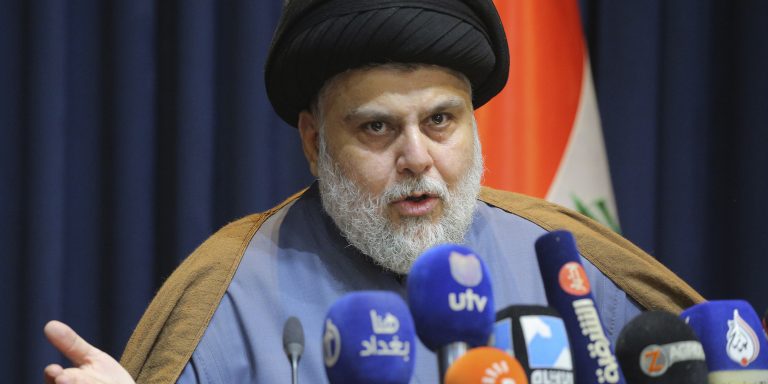INTELBRIEF
June 23, 2022
IntelBrief: Sadr Throws Iraqi Politics into Turmoil

Bottom Line up Front
- The decision by Shia cleric Moqtada al-Sadr to withdraw his large bloc from parliament clouds prospects for a broad-based government, eight months after national elections in Iraq.
- The resignations position pro-Iranian factions to determine the composition of the next government.
- Sadr’s move could trigger widespread unrest and or the calling of new elections.
- The United States has limited ability to influence the outcome of Iraq’s power struggle.
On June 12, after nearly eight months of failed efforts to form a government, influential Shia cleric Moqtada al-Sadr, conceded that his faction’s resounding victory in the October 2021 national elections in Iraq still did not enable him to assemble the government he envisioned. He ordered his Sadrist Movement (Sairoon) bloc’s 73 members of the Iraqi parliament to resign en masse. The withdrawal signaled that Sadr had failed to rally enough support from Sunni Arab and Kurdish factions in parliament to achieve the two-thirds majority (220) he had hoped for. Sadr defined a majority government as including all major sects, rather than continuing the post-Saddam governing structure that marginalizes non-Shia groups in favor of joining the Shia factions in a ruling alliance. The existing governmental structure, in Sadr’s view, set the stage for the October 2019 protests against official corruption and government ineffectiveness, and allocated too much influence to Iranian-backed factions, known as the Popular Mobilization Front (PMF). Yet, it was those same Iranian-aligned MPs that, despite suffering significant losses in the October elections, were able to prevent the Sadrists from gaining a majority in parliament and the ability to form their own government. Sadr’s efforts were further complicated by infighting between the two main Kurdish factions, who broke with tradition and put forward separate candidates for the presidential post, which by informal agreement is filled by a Kurd.
The withdrawal leaves Sadr’s opponents in the PMF and former Prime Minister Nouri al-Maliki’s party in a favorable position to form a government by uniting pro-Iranian factions into a political alliance known as the Coordination Front. Under Iraqi law, if a parliamentary seat is vacated, the candidate who received the next most votes in the electoral district steps up to fill the vacancy. Based on results provided by Iraq’s High Electoral Commission, an estimated 50 of the 73 vacated Sadrist seats are likely to go to Front members. This sets up a scenario in which Sadr’s rivals in the Coordination Front directly control more than 120 of the 329 seat Iraqi parliament. This is a powerful negotiating position from which they could convince Kurdish and Sunni parties to join their government, granting the Front a super-majority, effectively allowing them to elect their preferred presidential and prime ministerial candidates. Yet, the Front’s success is not assured, due to deep suspicions in the Sunni Arab and Kurdish blocs of Iranian meddling in Iraqi affairs. They will demand significant concessions - such as guarantees of coveted ministerial appointments - in exchange for their support.
If the Coordination Front fails to assemble a government, Iraq’s political pathway remains highly uncertain. Some Iraqi politicians have proposed giving independent parliamentarians the chance to form a government that would be supported and closely monitored by the Coordination Framework. Others have called on the Iraqi parliament to dissolve itself - a step that would trigger new elections which, however, may prove futile if the results due not differ significantly from last October’s vote. Some assess that Sadr might send his large contingent of supporters into the streets to demonstrate his continued commitment to democratic and majority rule, and to undermine the legitimacy of any government that does not include the Sadr movement. Although his popularity with young Iraqis remains in question, Sadr has shown a canny ability to mobilize sweeping protests based on the cult of personality he has established for himself. A popular show of force by Sadr, however, risks triggering substantial civil unrest and renewed political violence. Another option envisions a caretaker government consisting largely of existing officials, including Prime Minister Mustafa al-Kadhimi, remaining in place until all major factions can agree on a path forward to choose a new government.
The Sadrist withdrawal complicates U.S. policy in Iraq. American officials have long feared a political outcome in which Iran-backed groups exercise preponderant authority to implement policies favorable to Iran and detrimental to U.S. interests. Yet, it does not appear that U.S. diplomats in Baghdad have sufficient levers of power to steer the political process in Washington’s favor. U.S. officials favored Sadr’s attempts to put together a majority government, but they have few direct channels to Sadr and were unable to help achieve that outcome. Should Coordination Front leaders form a government, they are likely to champion Tehran’s efforts to engineer a formal Iraqi request that all U.S. military personnel leave Iraq; it is not clear that Washington would oppose a request from Baghdad that the remaining 2,500 U.S. military personnel fully withdraw. The U.S contingent in Iraq formally transitioned to an advisory role as of the end of 2021, signaling that Iraq is no longer dependent on U.S. help to suppress Islamic State fighters still operating in Iraq’s hinterlands. Unable to engineer their favored political result in Iraq, U.S. leaders are likely to accept a political outcome in Iraq that keeps the country stable and continues to integrate it into regional politics and economic activity. Iran and its supporters will need to tread cautiously; however, all Iraqi factions, even ones aligned with Iran, resent Iran’s overbearing presence, and support an emerging Iraqi nationalism independent of foreign control.